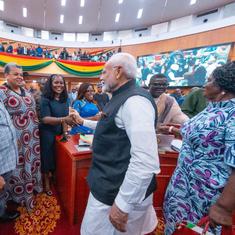The International Booker Prize longlist of 13 books has been announced. This year 11 novels and two collections of short stories are in the running for the prize. Kannada writer Banu Mushtaq and translator Deepa Bhasthi’s Heart Lamp: Selected Stories is the only book nominated from India. It is forthcoming from Penguin Random House India and And Other Stories in the UK in April 2025.
This year’s jury is chaired by author Max Porter and the other judges are: poet and photographer Caleb Femi; writer and Publishing Director of Wasafiri Sana Goyal; author and translator Anton Hur; and singer-songwriter Beth Orton. The judges made their selection from 154 books submitted by publishers – the highest number since the prize was launched in its current format in 2016.
The cash prize of £50,000 will be divided equally between the writer and translator. In addition, there is a prize of £5,000 for each of the shortlisted titles: £2,500 for the author and £2,500 for the translator.
The shortlist of six books will be announced on April 8 and the winner, on May 20 at a ceremony at Tate Modern, London.
All 13 authors have been longlisted for the first time for the Prize, including three with their debut books and eight with their first English-language publications. A classic of queer literature, first published in Dutch 43 years ago, marks the longest gap between an original-language publication and an International Booker Prize longlisting. Books nominated have been translated from ten original languages, including, for the first time, Kannada and Romanian. Between themselves, authors and translators represent 15 nationalities. This year, books from 11 independent publishers are in consideration – the highest number ever.
“In these books, people are sharing strategies for survival; they are cheating, lying, joking and innovating. Some people are no longer of this earth, or they are sending visions from the future or from parallel universes. These books bring us into the agony of family, workplace or nation-state politics, the near-spiritual secrecy of friendship, the inner architecture of erotic feeling, the banality of capitalism and the agitations of faith,” said Porter, the chair of the jury.

Here is the longlist:
A Leopard-Skin Hat, Anne Serre, translated from the French by Mark Hutchinson
A series of short scenes paints the portrait of a strong-willed and tormented young woman battling many demons, and of the narrator’s loving and anguished attachment to her. Serre poignantly depicts the bewildering back and forth between hope and despair involved in such a relationship, while playfully calling into question the very form of the novel. Written in the aftermath of the death of the author's little sister, A Leopard-Skin Hat is both the celebration of a tragically foreshortened life and a valedictory farewell, written in Anne Serre's signature style.

On A Woman’s Madness, Astrid Roemer, translated from the Dutch by Lucy Scott
When her abusive husband of just nine days refuses her request for divorce, Noenka flees her hometown in Suriname, on South America’s tropical northeastern coast, for the capital city of Paramaribo. Unsettled and unsupported, her life in this new place is illuminated by romance and new freedoms, but also forever haunted by her past and society’s expectations.
Strikingly translated by Lucy Scott, Astrid Roemer’s classic queer novel is a tentpole of European and post-colonial literature. And amid tales of plantation-dwelling snakes, rare orchids, and star-crossed lovers, it is also a blistering meditation on the cruelties we inflict on those who disobey.

Heart Lamp: Selected Stories, Banu Mushtaq, translated from the Kannada by Deepa Bhasthi
In the twelve stories of Heart Lamp, Banu Mushtaq exquisitely captures the everyday lives of women and girls in Muslim communities in southern India. Published originally in the Kannada language between 1990 and 2023, praised for their dry and gentle humour, these portraits of family and community tensions have garnered both censure from conservative as well as India’s progressive quarters.

Perfection, Vincenzo Latronico, translated from the Italian by Sophie Hughes
Millennial expat couple Anna and Tom are living the dream in Berlin, in a bright, affordable, plant-filled apartment. Their life as young digital creatives revolves around slow cooking, Danish furniture, sexual experimentation and the city’s twenty-four-hour party scene – an ideal existence shared by an entire generation and tantalizingly lived out on social media. But beyond the images, dissatisfaction and ennui burgeon. Work becomes repetitive. Friends move back home, have children, grow up. Frustrated that their progressive politics amount to little more in practice than boycotting Uber, tipping in cash, or never eating tuna, Anna and Tom make a fruitless attempt at political activism. Feeling increasingly trapped in their picture-perfect life, the couple takes ever more radical steps in the pursuit of authenticity and a sense of purpose perennially beyond their grasp.

Solenoid, Mircea Cărtărescu, translated from the Romanian by Sean Cotter
Based on Cărtărescu's own experience as a teacher, Solenoid submerges us in the mundane details of a diarist's life and spirals into an existential account of history, philosophy and mathematics. Grounded in the reality of communist Romania, it grapples with frightening health care, the absurdities of the education system and the struggles of family life, while investigating other universes and forking paths. In a surreal journey like no other, we visit a tuberculosis preventorium, an anti-death protest movement, a society of dream investigators and a minuscule world of dust mites living on a microscope slide. Combining fiction with autobiography and history, Solenoid searches for escape routes through the alternate dimensions of life and art, as various monstrous realities erupt within the present.

There’s a Monster Behind the Door, Gaëlle Bélem, translated from the French by Karen Fleetwood and Laetitia Saint-Loubert
The name Dessaintes is one to reckon with. A bombastic, violent and increasingly dangerous clan, little do they know that their downfall is being chronicled by one of their own.
This is La Reunion in the 1980s: high unemployment and low expectations, the legacy of postcolonialism. One little girl makes a bid to escape from her sadistic parents’ reign of terror and turns to school for salvation.
Rich in the history of the island’s customs and superstitions, and driven by wild, offbeat humour, this picaresque tale manages to satirize the very notion of freedom available in this French territory.

On the Calculation of Volume, Solvej Balle, translated from the Dutch by Barbara J Haveland
Tara Selter has slipped out of time.
Every morning, she wakes up to the 18th of November. She no longer expects to wake up to the 19th of November, and she no longer remembers the 17th of November as if it were yesterday.
She comes to know the shape of the day like the back of her hand – the grey morning light in her Paris hotel; the moment a blackbird breaks into song; her husband's surprise at seeing her return home unannounced. But for everyone around her, this day is lived for the first and only time. They do not remember the other 18ths of November, and they do not believe her when she tries to explain.
As Tara approaches her 365th 18th of November, she can’t shake the feeling that somewhere underneath the surface of this day, there’s a way to escape.

The Book of Disappearance, Ibtisam Azem, translated from the Arabic by Sinan Antoon
Alaa is haunted by his grandmother’s memories of being displaced from Jaffa and becoming a refugee in her homeland after the Nakba. Ariel, Alaa’s neighbour and friend, is a liberal Zionist, critical of the military occupation of the West Bank and Gaza yet faithful to the project of Israel. When he wakes up one morning to find that all Palestinians have suddenly vanished, Ariel begins searching for clues to the secret of their collective disappearance.
That search, and Ariel’s reactions to it, intimately reveal the fissures at the heart of the Palestinian question. Between the stories of Alaa and Ariel are the people of Jaffa and Tel Aviv – café patrons, radio commentators, flower-cutters – against whose ordinary lives these fissures and questions play out.

Eurotrash, Christian Kracht, translated from the German by Daniel Bowles
Realising he and she are the very worst kind of people, a middle-aged man embarks on a dubious road trip through Switzerland with his 80-year-old mother, recently discharged from a mental institution. Traversing the country in a hired cab, they attempt to give away the wealth she has amassed from investing in the arms industry, but a fortune of such immensity is surprisingly hard to squander. Haunted in different ways by the figure of her father, an ardent supporter of Nazism, mother and son can no longer avoid delving into the darkest truths about their past.

Reservoir Bitches, Dahlia de la Cerda, translated from Spanish by Heather Cleary and Julia Sanches
In the linked stories of Reservoir Bitches, thirteen Mexican women prod the bitch that is Life as they fight, sew, skirt, cheat, cry, and lie their way through their tangled circumstances. From the all-powerful daughter of a cartel boss to the victim of transfemicide, from a houseful of spinster seamstresses to a socialite who supports her politician husband by faking Indigenous roots, these women spit on their own reduction and invent new ways to survive, telling their stories in bold, unapologetic voices.

Small Boat, Vincent Delecroix, translated from French by Helen Stevenson
In November 2021, an inflatable dinghy carrying migrants from France to the United Kingdom capsized in the Channel causing the death of 27 people on board. Despite receiving numerous calls for help, the French authorities wrongly told the migrants they were in British waters and had to call the British authorities for help. By the time rescue vessels arrived on the scene, all but two of the migrants had died. The narrator of Delecroix’s fictional account of the events is the woman who took the calls. Accused of failing in her duty, she refuses to be held more responsible than others for this disaster. Why should she be more responsible than the sea, than the war, than the crises behind these tragedies?

Hunchback, Saou Ichikawa, translated from Japanese by Polly Barton
Born with a congenital muscle disorder, Shaka Isawa has severe spine curvature and uses an electric wheelchair and ventilator. Within the limits of her care home, her life is lived online: she studies, she tweets indignantly, she posts outrageous stories on an erotica website. One day, a new male carer reveals he has read it all – the sex, the provocation, the dirt. Her response? An indecent proposal…

Under the Eye of the Big Bird, Hiromi Kawakami, translated from Japanese by Asa Yoneda
In the distant future, humans are on the verge of extinction and have settled in small tribes across the planet under the observation and care of the Mothers. Some children are made in factories, from the cells of rabbits and dolphins; some live by getting nutrients from water and light, like plants. The survival of the race depends on the interbreeding of these and other alien beings – but it is far from certain that connection, love, reproduction, and evolution will persist among the inhabitants of this faltering new world.











